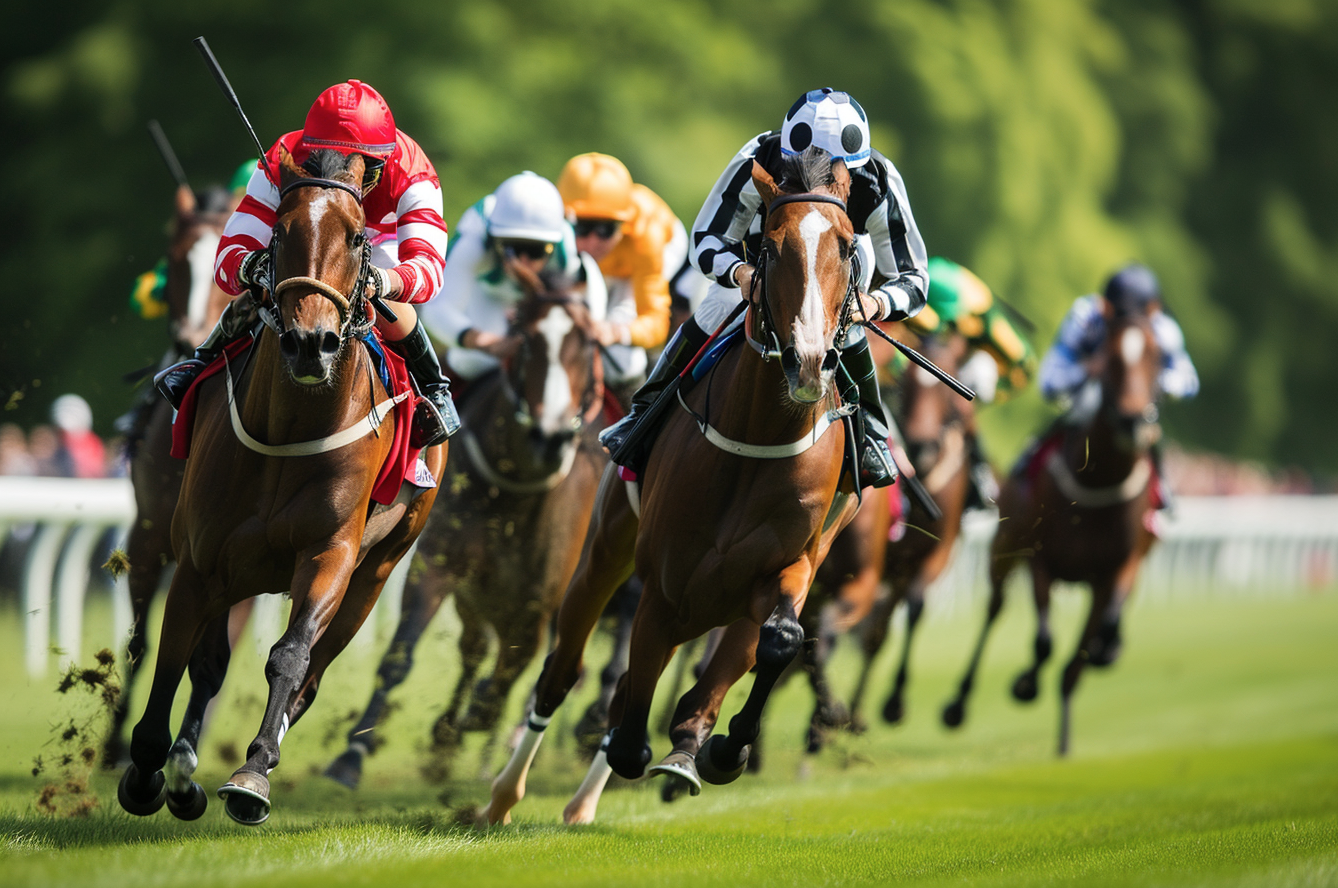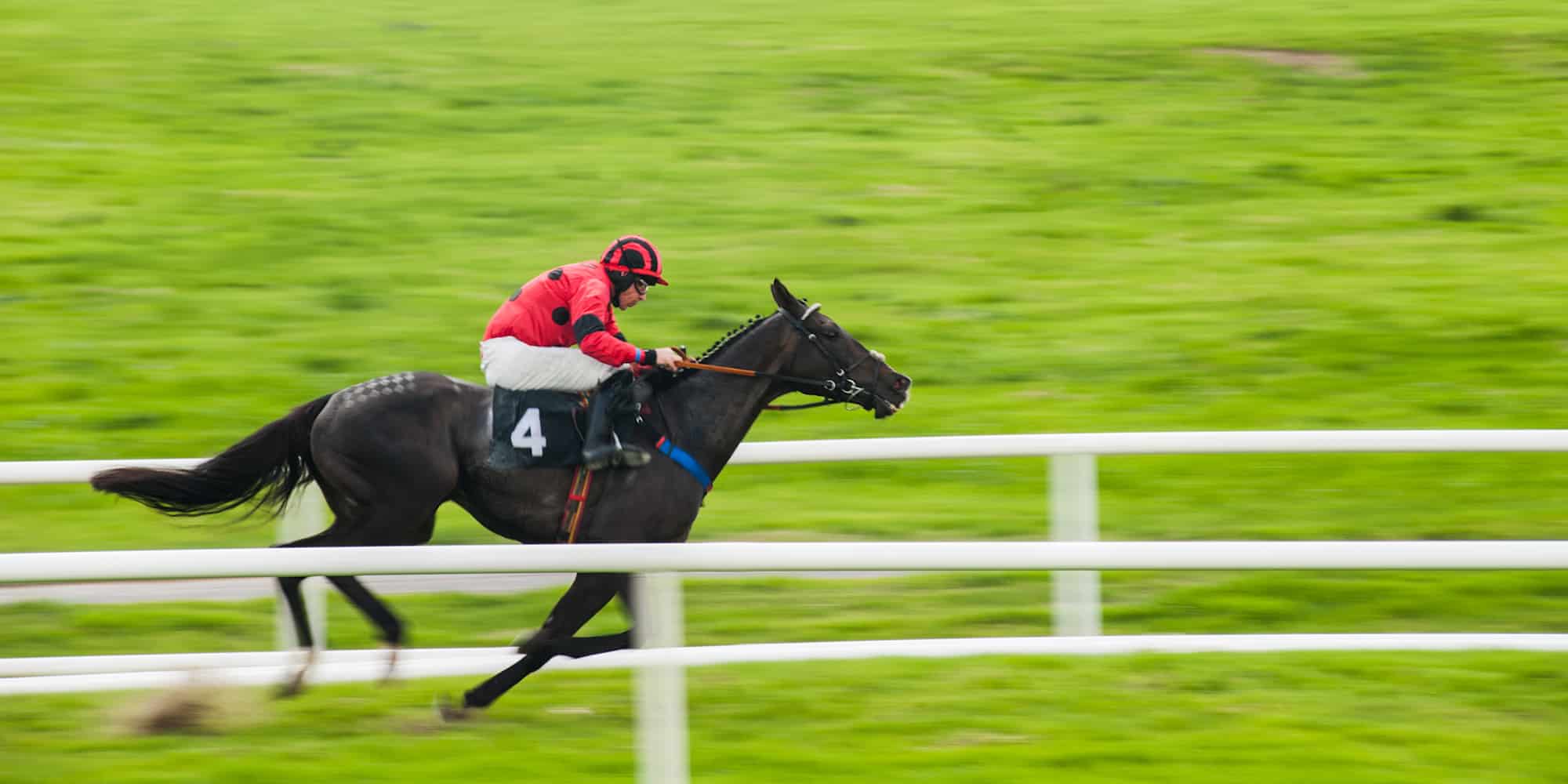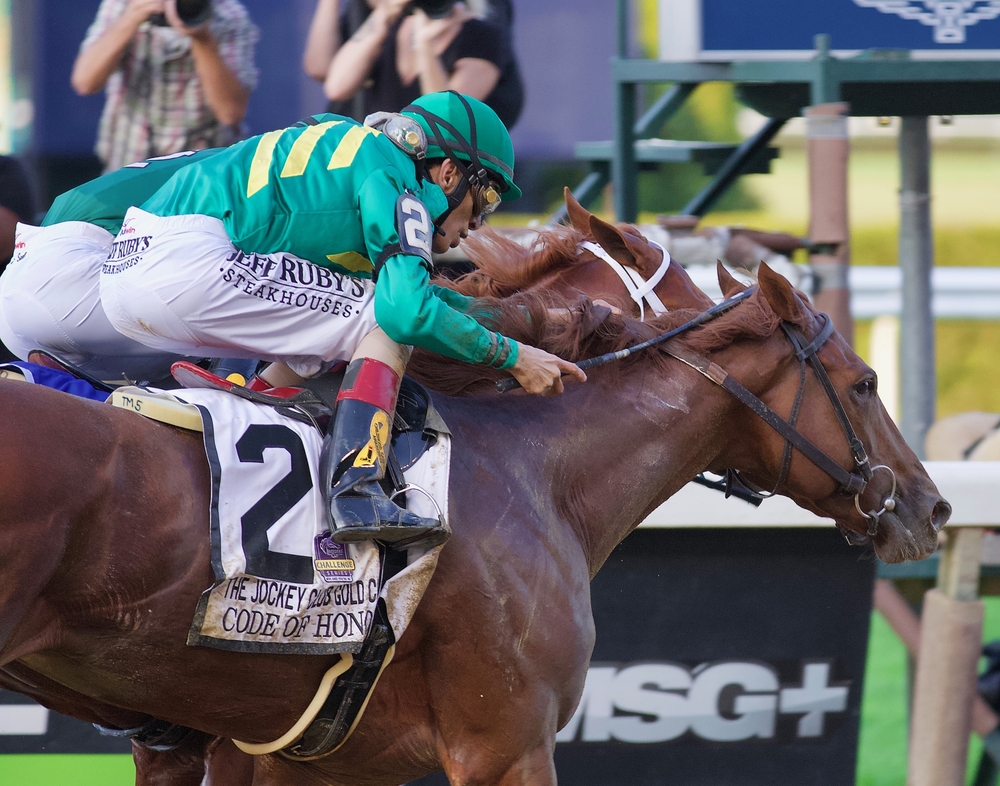Betting on horse racing can be an exciting experience, but it can also be overwhelming, especially if you are new to it. Picking a winning horse can seem like a daunting task, but with some knowledge and research, you can increase your chances of success.
One of the most important things to consider when picking a horse is their past performance. Look at their previous race results, the track conditions, and the jockey’s performance. This information can help you identify patterns and trends that can give you an edge in picking a winning horse. Additionally, consider the horse’s form. A horse that has been consistently performing well is more likely to continue to do so.
Another factor to consider is the odds. The odds reflect the probability of a horse winning, and they are determined by the amount of money bet on each horse. A horse with low odds is considered a favourite, while a horse with high odds is considered an underdog. While favourites are more likely to win, they also have lower payouts. On the other hand, underdogs have higher payouts but are less likely to win. Understanding the odds can help you make more informed betting decisions.
Understanding Horse Racing
Horse racing is a popular sport that involves horses running on a track. The goal of horse racing is to determine which horse is the fastest and the most skilled. Horse racing takes place at different racecourses, which are venues specifically designed for horse racing.
Before placing a bet on a racehorse, it is important to understand the different classifications of races. Racing programs provide detailed information about the horses competing in the race, their past performances, and their odds of winning. Understanding the classification and course form of the horse can help you make an informed decision when it comes to placing your bet.
Horse racing has different classifications, which are based on the age and ability of the horses. The most common classifications include:
- Maiden races: Races for horses that have never won a race before.
- Claiming races: Races where horses are for sale at a predetermined price.
- Allowance races: Races where horses carry a certain weight based on their past performances.
- Stakes races: Races with the highest purses and the most prestigious titles.
In addition to understanding the classifications, it is also important to consider the course form of the horse. Course form refers to how well a horse performs on a particular track. Some horses may perform better on a certain type of track, such as a dirt track or a turf track.
By understanding the classifications and course form of the horse, you can make an informed decision when placing your bet. It is important to remember that horse racing is a sport and there is always an element of unpredictability. Therefore, it is important to bet responsibly and within your means.
Basics of Horse Betting
Betting on horse racing is an exciting way to add some thrill to the sport. However, it can be overwhelming for beginners who don’t know where to start. In this section, we’ll cover the basics of horse betting to help you get started.
Types of Bets
There are several types of bets you can place when betting on horse racing. Here are some of the most common ones:
- Win: A bet on a horse to finish first.
- Place: A bet on a horse to finish first or second.
- Show: A bet on a horse to finish first, second, or third.
- Exacta: A bet on the first and second place finishers in exact order.
- Trifecta: A bet on the first, second, and third place finishers in exact order.
- Superfecta: A bet on the first, second, third, and fourth place finishers in exact order.
- Daily Double: A bet on the winners of two consecutive races.
- Across the Board: A bet on a horse to win, place, and show.
Pari-Mutuel Wagering
In horse racing, bets are placed through a system called pari-mutuel wagering. This means that all bets are pooled together, and the payout is determined by the total amount of money bet on the winning horse, minus a percentage for the track’s takeout.
Strategies and Budget
When betting on horse racing, it’s important to have a strategy and a budget. Decide how much money you’re willing to spend and stick to it. Don’t bet more than you can afford to lose.
One popular strategy is to focus on multi-race bets, such as the Pick 3 or Pick 4. These bets offer the chance for a big payout but require picking the winners of multiple races.
Odds and Bookmakers
Before placing a bet, it’s important to understand the odds. The odds represent the probability of a horse winning, and they determine the payout. Bookmakers set the odds based on the amount of money bet on each horse, as well as other factors such as the horse’s past performance and the jockey’s skill.
In conclusion, understanding the basics of horse betting is essential before placing a bet. Knowing the types of bets, pari-mutuel wagering, strategies and budget, and odds can help you make informed decisions and increase your chances of winning.
Understanding Horses
When it comes to betting on horse racing, understanding horses is key. Here are some key factors to consider when picking a horse:
Age
Age is an important factor to consider when picking a horse. Generally, younger horses have more potential for growth and improvement, but they may lack the experience of older horses. On the other hand, older horses may have more experience, but they may be past their peak performance.
Gender
Gender can also play a role in a horse’s performance. In general, male horses (stallions and geldings) tend to be more aggressive and may have more stamina, while female horses (mares) may be more temperamental.
Name and Colour
While a horse’s name and colour may be fun to consider, they have no impact on a horse’s performance. It’s important to focus on the horse’s actual abilities and past performance instead.
Temperament
A horse’s temperament can also be a factor to consider. Some horses may be more high-strung and difficult to handle, while others may be more laid-back. This can impact how the horse performs on race day.
Stamina and Breeding
A horse’s stamina is an important factor to consider when picking a winning horse. This can be influenced by the horse’s breeding, as well as their sire and dam. It’s important to research a horse’s breeding and bloodlines to get a better understanding of their potential for success.
Equipment
Finally, the equipment a horse wears can also impact their performance. This includes things like the type of bit used in their bridle, as well as any special shoes or other gear they may wear. It’s important to pay attention to these details when researching a horse’s past performance.
Choosing the Right Horse
When it comes to betting on horse racing, picking the right horse is crucial. Here are some tips to help you choose a winning horse:
Do Your Research
Before placing your bet, it’s important to do your research. Look up the horse’s past performances, including its rating and official rating. Horse racing statistics can also be helpful in determining a horse’s chances of winning.
Consider the Horse’s Form
The form of a horse is a crucial factor to consider when picking a winner. Look at the horse’s recent runs and losses to gauge its current form. You can find this information in form guides and the racecard.
Look at the Connections
The connections of a horse, including its trainer and jockey, can also play a significant role in its chances of winning. Look for horses with experienced and successful connections.
Seek Expert Tips
Expert betting tips and advice can also be helpful in making an informed decision. Look for reputable sources and consider their opinions alongside your own research.
Overall, when picking a horse to bet on, it’s important to do your research, consider the horse’s form and connections, and seek expert advice when possible. Remember, there is no guaranteed way to pick a winner, so always bet responsibly and within your means.
Understanding the Track and Conditions
When betting on horse racing, it’s important to understand the track and conditions to make an informed decision. The track and conditions can have a significant impact on a horse’s performance, so it’s essential to consider them when making your selection.
Track Types
Horse racing can take place on a variety of surfaces, including turf (grass) and dirt. Some tracks may also have synthetic surfaces. Each surface has its own characteristics and can affect a horse’s performance differently. Turf tracks are generally more forgiving and provide more cushioning for the horse’s legs, while dirt tracks tend to be firmer and faster.
Track Conditions
The track conditions can also play a significant role in a horse’s performance. The going, or track condition, refers to the state of the track surface. The going can range from good to firm, soft, yielding, or heavy. Each going condition can affect a horse’s performance differently.
In general, horses tend to perform better on firmer ground, as it provides a better grip for their hooves. However, some horses may prefer softer ground, particularly if they have a more powerful stride.
Winter Months
During the winter months, tracks can become more challenging for horses to navigate due to rain, snow, and ice. It’s essential to consider the track conditions during these months, as they can significantly impact a horse’s performance.
Venue Preference
Some horses may also have a preference for a particular venue. For example, some horses may perform better at a particular track due to the track’s characteristics or layout. It’s essential to consider a horse’s past performances at a particular venue when making your selection.
Overall, understanding the track and conditions is essential when betting on horse racing. By considering the track type, track conditions, and venue preference, you can make a more informed decision when placing your bet.
Understanding the Race Details
When betting on horse racing, it’s essential to understand the race details before placing your bet. Here are some key factors to consider:
Distance
The distance of the race is an important factor to consider when picking a horse to bet on. Some horses perform better over a shorter distance, while others excel over a longer distance. Make sure to check the race distance and compare it to the horse’s past performance to see if it’s suited for the race.
Draw
The draw, or the starting position, can also impact a horse’s performance. Some tracks have a bias towards certain draw positions, so it’s essential to check the track bias before placing your bet. Additionally, some horses prefer to run on the inside or outside, so consider the horse’s running style when assessing the draw.
Weight
The weight a horse carries can also impact its performance. The weight assigned to a horse is determined by the conditions of the race, such as the horse’s age, sex, and past performance. Generally, a horse carrying more weight will have a disadvantage, so it’s essential to consider the weight when picking a horse to bet on.
Box
The box, or the barrier, is the stall where the horse starts the race. Similar to the draw, some tracks have a bias towards certain box positions, so it’s essential to check the track bias before placing your bet. Additionally, some horses prefer to run on the inside or outside, so consider the horse’s running style when assessing the box position.
By understanding the race details, you can make an informed decision when picking a horse to bet on. Consider the distance, draw, weight, and box when assessing each horse’s performance and make sure to check the track bias to increase your chances of winning.
Role of Trainers and Jockeys
When it comes to picking a horse for betting, trainers and jockeys play a crucial role in determining the horse’s performance. A good trainer can make a significant difference in a horse’s form and fitness, while a skilled jockey can make all the difference in the race. Here are some things to keep in mind when considering the role of trainers and jockeys in horse racing:
Trainers
Trainers are responsible for preparing the horse for the race. They are responsible for the horse’s fitness, form, and well-being. A good trainer can identify a horse’s strengths and weaknesses and work on them to improve the horse’s overall performance. They also decide which races the horse should enter and develop a training program accordingly.
When looking at a trainer’s record, it is important to consider the trainer’s win percentage, the number of races they have won, and the types of races they have won. Some trainers specialise in certain types of races, such as sprints or long-distance races. It is also important to consider the trainer’s reputation and experience in the industry.
Jockeys
Jockeys are responsible for riding the horse during the race. They must be skilled in controlling the horse’s pace and positioning the horse in the best possible position to win the race. A good jockey can make all the difference in a race, especially in a closely contested race.
When looking at a jockey’s record, it is important to consider their win percentage, the number of races they have won, and the types of races they have won. Some jockeys specialise in certain types of races, such as flat races or jump races. It is also important to consider the jockey’s reputation and experience in the industry.
Owners and Pedigree
While trainers and jockeys play a crucial role in a horse’s performance, it is also important to consider the horse’s owner and pedigree. A well-bred horse with a successful lineage is more likely to perform well in races. Additionally, a horse owned by a successful owner is more likely to have access to better training facilities and resources.
When looking at a horse’s pedigree, it is important to consider the horse’s bloodline and the success of its ancestors. Some bloodlines are known for producing successful racehorses, while others are not. It is important to do your research and consider the horse’s pedigree when making your decision.
In conclusion, trainers and jockeys play a crucial role in a horse’s performance, and it is important to consider their records and reputation when making your betting decisions. Additionally, the horse’s owner and pedigree should also be taken into consideration. By doing your research and considering all of these factors, you can increase your chances of making a successful bet on horse racing.
Betting in Different Locations
When it comes to horse racing, betting can vary depending on the location. In America, the most popular event to bet on is the Kentucky Derby, which takes place annually on the first Saturday in May. The Kentucky Derby is known for its high stakes and is considered one of the most prestigious horse racing events in the world.
Handicapping is a common technique used by bettors to increase their chances of winning. This involves analysing a horse’s past performances, including their speed, form, and jockey. By doing this, bettors can make more informed decisions when placing their bets.
Longshots are horses that are considered unlikely to win, but can offer high payouts if they do. Each way betting is a popular way to bet on longshots, as it allows bettors to place a bet on a horse to win or place (usually finishing in the top three). This can be a good strategy for those looking to take a risk and potentially win big.
It’s important to note that betting laws and regulations can vary depending on the location. In America, for example, online betting is only legal in certain states. It’s important to research the laws in your area before placing any bets.
Overall, when it comes to betting on horse racing, it’s important to do your research and make informed decisions. By analysing past performances and understanding the different types of bets available, you can increase your chances of winning and potentially walk away with a big payout.
Understanding Horse Racing Betting Sites
When it comes to betting on horse racing, there are many online betting sites to choose from. These sites offer a variety of betting options, from simple win bets to more complex exotic bets. Here are some things to keep in mind when choosing a horse racing betting site:
Reputation
It’s important to choose a betting site with a good reputation. Look for sites that are licensed and regulated by reputable authorities. You can also check online reviews and forums to see what other bettors have to say about the site.
Betting Options
Different betting sites offer different types of bets. Some sites may only offer win, place, and show bets, while others may offer a wide range of exotic bets like exactas, trifectas, and superfectas. Look for a site that offers the types of bets you’re interested in.
Odds and Payouts
The odds and payouts offered by different betting sites can vary widely. Look for a site that offers competitive odds and generous payouts. You can compare odds and payouts from different sites to find the best value.
User Interface
A good user interface can make all the difference when it comes to placing bets. Look for a site with a clean, intuitive interface that makes it easy to find the races and bets you’re interested in. Some sites also offer mobile apps that allow you to bet on the go.
Bonuses and Promotions
Many betting sites offer bonuses and promotions to attract new customers. These can include welcome bonuses, free bets, and other incentives. Look for a site that offers bonuses and promotions that are relevant to your betting interests.
Overall, choosing a horse racing betting site requires careful consideration. By keeping these factors in mind, you can find a site that offers the betting options, odds, and user experience that best suit your needs.
Frequently Asked Questions
What is a simple winning system for horse racing?
There is no guaranteed winning system for horse racing. However, there are some basic strategies that can help increase your chances of winning. For example, you can study the form of the horses, look at their previous performances, and consider factors such as the jockey, the trainer, and the track conditions. It’s also important to set a budget and stick to it, and to avoid chasing losses.
What are the secrets to picking winners in horse racing?
There are no secrets to picking winners in horse racing. However, there are some useful tips that can help you make more informed decisions. For example, you can study the form of the horses, look at their previous performances, and consider factors such as the jockey, the trainer, and the track conditions. It’s also important to set a budget and stick to it, and to avoid chasing losses.
How can I spot a good horse to bet on?
To spot a good horse to bet on, you should study the form of the horses, look at their previous performances, and consider factors such as the jockey, the trainer, and the track conditions. You should also look for horses that are in good physical condition, have a good temperament, and are well-trained. It’s important to do your research and avoid making impulsive decisions based on emotions.
Is there a strategy to betting on horses?
There is no guaranteed strategy to betting on horses. However, there are some basic principles that can help increase your chances of winning. For example, you should study the form of the horses, look at their previous performances, and consider factors such as the jockey, the trainer, and the track conditions. You should also set a budget and stick to it, and avoid chasing losses.
Which horse is most likely to win in a race?
There is no way to predict with certainty which horse is most likely to win in a race. However, you can study the form of the horses, look at their previous performances, and consider factors such as the jockey, the trainer, and the track conditions. You should also look for horses that are in good physical condition, have a good temperament, and are well-trained.
How do I place a bet on horses at a racecourse?
To place a bet on horses at a racecourse, you should first find a bookmaker or a betting shop. You should then decide on the amount you want to bet and the type of bet you want to place (e.g. win, place, each-way). You should then fill out a betting slip and hand it to the bookmaker or the cashier. If your bet is successful, you can collect your winnings from the bookmaker or the cashier.





